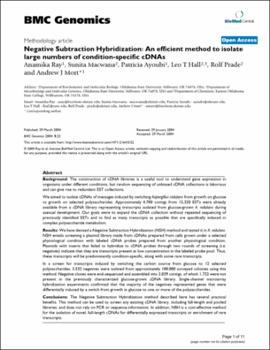| dc.contributor.author | Ray, Anamika | |
| dc.contributor.author | Macwana, Sunita | |
| dc.contributor.author | Ayoubi, Patricia | |
| dc.contributor.author | Hall, Leo T. | |
| dc.contributor.author | Prade, Rolf | |
| dc.contributor.author | Mort, Andrew J. | |
| dc.date.accessioned | 2018-11-09T21:10:52Z | |
| dc.date.available | 2018-11-09T21:10:52Z | |
| dc.date.issued | 2004-03-29 | |
| dc.identifier | oksd_ray_negativesubtrac_2004 | |
| dc.identifier.citation | Ray, A., Macwana, S., Ayoubi, P., Hall, L. T., Prade, R., & Mort, A. J. (2004). Negative Subtraction Hybridization: An efficient method to isolate large numbers of condition-specific cDNAs. BMC Genomics, 5, Article 22. https://doi.org/10.1186/1471-2164-5-22 | |
| dc.identifier.uri | https://hdl.handle.net/11244/302065 | |
| dc.description.abstract | Background: The construction of cDNA libraries is a useful tool to understand gene expression in organisms under different conditions, but random sequencing of unbiased cDNA collections is laborious and can give rise to redundant EST collections. | |
| dc.description.abstract | We aimed to isolate cDNAs of messages induced by switching Aspergillus nidulans from growth on glucose to growth on selected polysaccharides. Approximately 4,700 contigs from 12,320 ESTs were already available from a cDNA library representing transcripts isolated from glucose-grown A. nidulans during asexual development. Our goals were to expand the cDNA collection without repeated sequencing of previously identified ESTs and to find as many transcripts as possible that are specifically induced in complex polysaccharide metabolism. | |
| dc.description.abstract | Results: We have devised a Negative Subtraction Hybridization (NSH) method and tested it in A. nidulans. NSH entails screening a plasmid library made from cDNAs prepared from cells grown under a selected physiological condition with labeled cDNA probes prepared from another physiological condition. Plasmids with inserts that failed to hybridize to cDNA probes through two rounds of screening (i.e. negatives) indicate that they are transcripts present at low concentration in the labeled probe pool. Thus, these transcripts will be predominantly condition-specific, along with some rare transcripts. | |
| dc.description.abstract | In a screen for transcripts induced by switching the carbon source from glucose to 12 selected polysaccharides, 3,532 negatives were isolated from approximately 100,000 surveyed colonies using this method. Negative clones were end-sequenced and assembled into 2,039 contigs, of which 1,722 were not present in the previously characterized glucose-grown cDNA library. Single-channel microarray hybridization experiments confirmed that the majority of the negatives represented genes that were differentially induced by a switch from growth in glucose to one or more of the polysaccharides. | |
| dc.description.abstract | Conclusions: The Negative Subtraction Hybridization method described here has several practical benefits. This method can be used to screen any existing cDNA library, including full-length and pooled libraries, and does not rely on PCR or sequence information. In addition, NSH is a cost-effective method for the isolation of novel, full-length cDNAs for differentially expressed transcripts or enrichment of rare transcripts. | |
| dc.format | application/pdf | |
| dc.language | en_US | |
| dc.publisher | BioMed Central | |
| dc.rights | This material has been previously published. In the Oklahoma State University Library's institutional repository this version is made available through the open access principles and the terms of agreement/consent between the author(s) and the publisher. The permission policy on the use, reproduction or distribution of the material falls under fair use for educational, scholarship, and research purposes. Contact Digital Resources and Discovery Services at lib-dls@okstate.edu or 405-744-9161 for further information. | |
| dc.title | Negative Subtraction Hybridization: An efficient method to isolate large numbers of condition-specific cDNAs | |
| osu.filename | oksd_ray_negativesubtrac_2004.pdf | |
| dc.description.peerreview | Peer reviewed | |
| dc.identifier.doi | 10.1186/1471-2164-5-22 | |
| dc.description.department | Biochemistry and Molecular Biology | |
| dc.description.department | Microbiology and Molecular Genetics | |
| dc.type.genre | Article | |
| dc.type.material | Text | |
| dc.subject.keywords | cDNA library | |
| dc.subject.keywords | fungal culture | |
| dc.subject.keywords | suppressive subtractive hybridization | |
| dc.subject.keywords | rare transcript | |
| dc.subject.keywords | representational difference analysis | |
